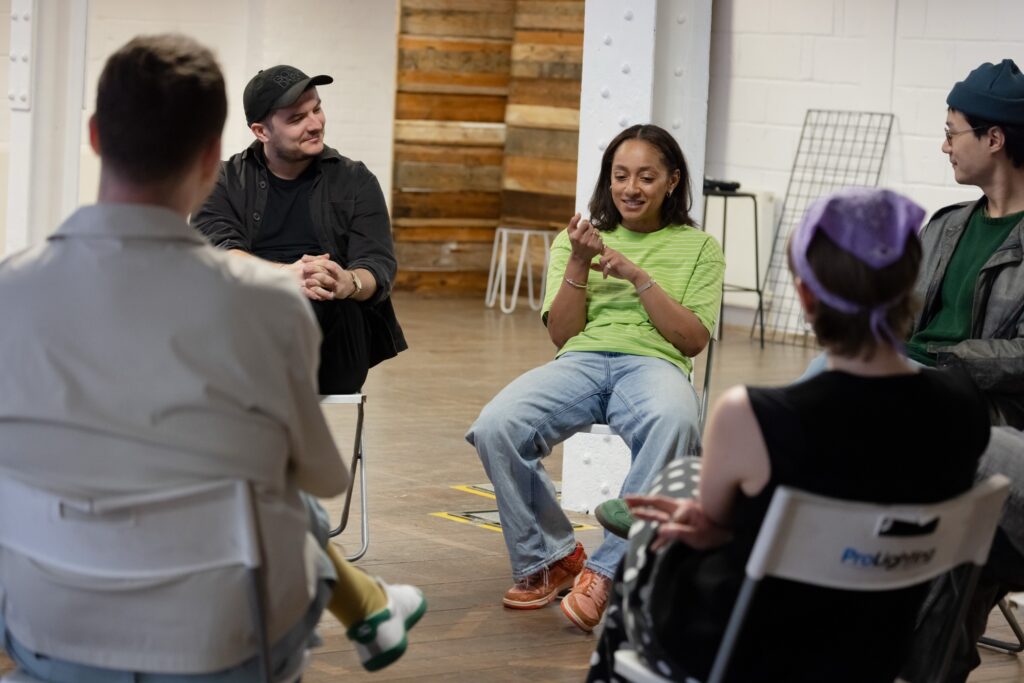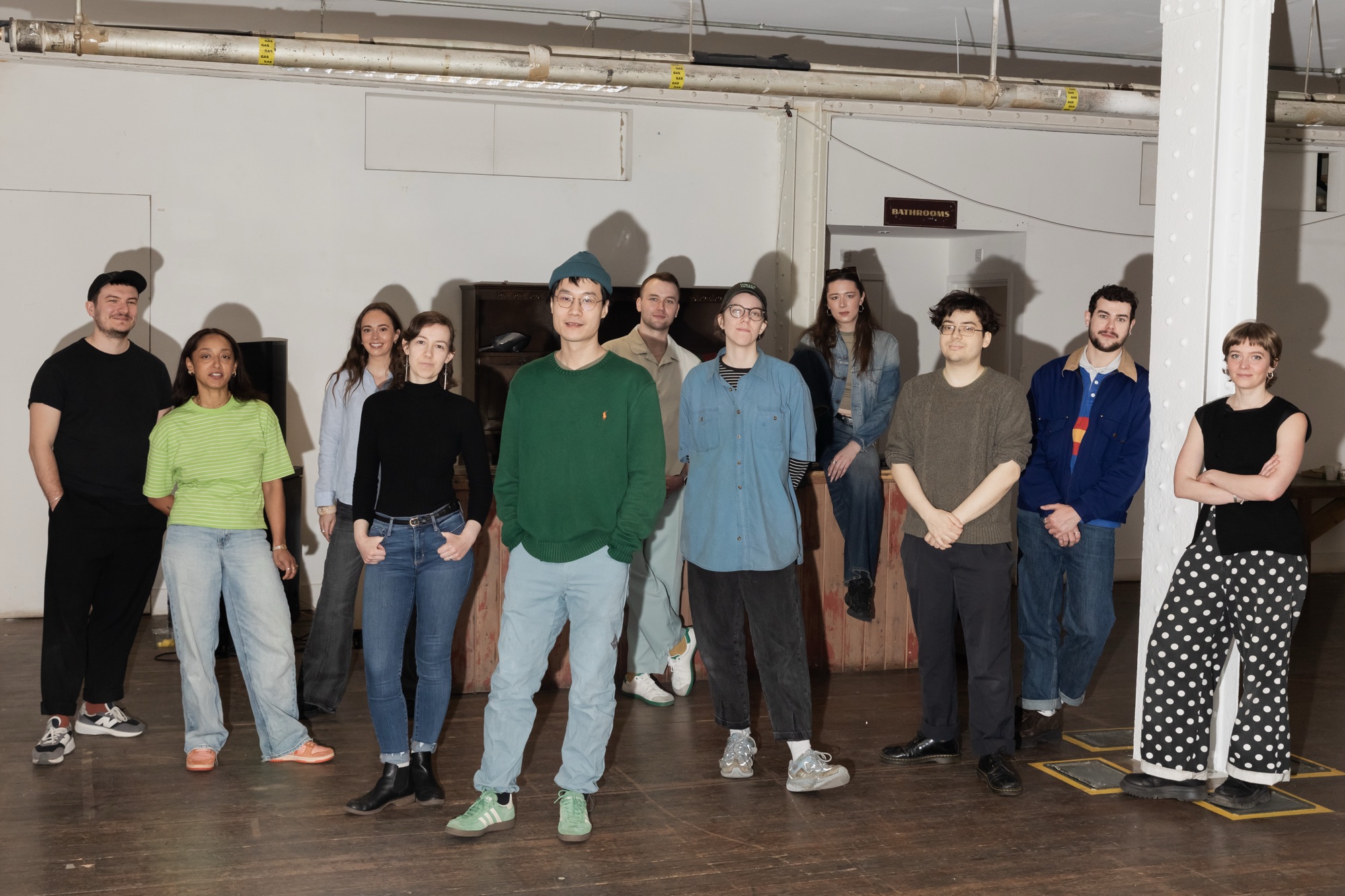Words by Paula Riofrio from DAJ and Sam Burkett from CDS.
In March 2025, Chisenhale Dance Space (CDS) announced a bold new initiative to revive and reimagine the spirit of scratch performance: Scratch Renaissance. Running from May 2025 to July 2026, this year-long programme invites artists to experiment, discover and play. At its heart are monthly scratch nights, each conceived, produced and delivered by one of six independent artist-led collectives.
Scratch Renaissance responds directly to the urgent need for accessible, low-pressure opportunities for artists to test ideas and share works-in-progress. In recent years, the grassroots performance sector—particularly in London—has faced significant setbacks. The impact of the pandemic, combined with rising living and production costs, and the closure of key platforms such as VAULT Festival, has dramatically reduced the number of available opportunities for early-career and marginalised artists to develop work in front of an audience.
Recognising these challenges, CDS—in collaboration with its 230-strong artist community—has designed Scratch Renaissance as a year-long catalyst for creative risk and renewal. The programme centres artist-led models of working, prioritising experimentation over polish and process over product.
Across the period, CDS will host a series of monthly scratch nights at its East London venue. In line with its commitment to artist leadership, CDS has invited six collectives from across the live performance landscape—including dance, theatre, drag, cabaret and improvisation—to co-create six distinct scratch formats. These events aim to broaden what a scratch night can be, while offering a vital platform for marginalised voices and first-time sharings.
The six collectives—together forming the Scratch Renaissance Consortium—will also share learning and best practice throughout the project, with the goal of developing more sustainable and inclusive approaches to scratch culture across the UK.
At a recent roundtable discussion with members of the consortium, conversation reflected on the disappearance of scratch culture, the urgency of its return, and the different values and priorities that each partner brings to this shared endeavour. We discussed how Scratch Renaissance might shape future opportunities for artists, audiences, and the wider sector.
The roundtable featured:
– Ben Kulvichit from Emergency Chorus
– Jack Edwards from Elevate East
– Théïa Maldoom from Mind the Gap
– Shannelle ‘Tali’ Fergus from identity.ideas.industry (iii)
– He Zhang & Xiaonan Wang from Ensemble Not Found
– Tamm Reynolds, also known by their stage name Midgette Bardot
– Frances Morgan, Sam Burkett, and Reece McMahon from CDS
Many of the partners involved have been directly influenced by scratch culture, whether through hosting, performing, or attending scratch nights across the UK. While their perspectives and practices vary, they share a common commitment to cultivating space for experimentation, dialogue, and community-led performance-making.
—
Inside the Chisenhale building, the Scratch Renaissance partners and CDS staff stood, cups of tea in hand, chatting about projects past and present. There was a real warmth in the room as everyone appeared genuinely excited by the possibilities of the project.
Théïa Maldoom, creator of Mind The Gap: Open Night (a part-curated, part-lottery open mic for improvised performance) noted: “It’s very nice to have this funding and support now from CDS with Scratch Renaissance. It’s really appreciated because I can think about things such as why I started Mind The Gap and what I want it to be—with a bit more clarity for once and with the support of others in the consortium who are also trying to make things happen.”
We gathered in a circle, and the conversation turned to why scratch nights were so crucial to the independent performance sector: “Scratch nights can shake performers’ cores, making them re-evaluate their work and take risks.”offered Tamm Reynolds, aka Midgitte Bardot who will host This is a Threat, an evening of durational, crip-focused work later this year – “Scratch provides a space for performers to experiment and make last-minute changes, which can be both challenging and empowering. In many ways it can make them realise where their true integrity lies as an artist.”

While hearing about the importance of and excitement around scratch nights, there was a consensus that scratch culture isn’t the same as it used to be, which begs the question: why?
A recurring theme was the impact of the COVID-19 pandemic. Reece McMahon, CDS Executive Director, noted the loss of opportunities in the sector: “The pandemic changed things. Many scratch nights disappeared, and it certainly feels like during the last 14 years, the sector has been tightening, pushing out scratch nights.
Across the country, and particularly in London, time and money have always posed significant challenges for artists—challenges that were only amplified by the pandemic. Reece continued – “but it seems DIY culture always emerges when things get tough—it’s about making things happen from nothing. And, in the current climate, we will have to continue to make things happen, but I hope not at the cost of the important things we need to keep advocating for, like diversity and equity.”
Jack Edwards, from Elevate East, added: “I think it’s hard to make a sustainable scratch night in the current climate. Venues have increased their costs to cover their overheads, meaning it is harder to get your foot in the door with a new, untested model.”
Shannelle ‘Tali’ Fergus of identity.ideas.industry (iii) highlighted the struggle for access to spaces and autonomy as artists: “Everything feels like a battle for resources. I get frustrated with not being given enough support. It feels crazy that you have to dedicate time to find the venue, then to organise, and then everything has to revolve around that. And you find yourself at the whim of their institutional decision. There’s no balance there, and they very much have the power.”
Despite these challenges, everyone in the room shared a deep love for these grassroots spaces; telling stories of nights and performances that you just don’t get in more established venues.
Frances Morgan, CDS Artist Community Producer, reflected on the historical lineage of scratch at Chisenhale Dance Space, “There was a night called ‘Cha Cha Cha,’ which was integral to the early days of CDS in the ’80s. It was created through a collaboration between professional artists and local people—a coming-together to experience something unique.”
Ben Kulvichit of Emergency Chorus added, “There also used to be a night in London I remember going to as a student and what made it special was the crossover between experimental music and dance—it brought together a really interesting mix of people. I think these kinds of crossovers happened in lots of different venues.”
Scratch nights invite artists to challenge their practices and connect with other artists and audiences in ways that do not exist elsewhere. Xiaonan Wang, of Ensemble Not Found spoke to this spirit of growth and community – “I feel that through scratch nights, we experiment; we receive feedback from peers and audiences and refine our work. It is a valuable opportunity for artists to be seen and recognised. This cultivates a supportive environment and a sustainable model for developing new shows. During the work-in-progress journey, artists gradually build an audience and attract attention organically. This kind of networking through scratch nights is often quite effective—it helps artists find their like-minded people who resonate with their work.”
At their core, scratch nights represent a deeply collaborative, resourceful and inclusive practice. Despite financial strain and institutional barriers, their enduring presence speaks to a collective desire for connection, experimentation, and creative autonomy.
Reece reflected on this potential: “I’m hoping Scratch Renaissance and the work we do to explore how these nights can sit within the sector today might help us understand how to centre these important aspects of inclusion, even when resource is limited.”
For artists, they offer space to take risks, receive feedback, and build community. For audiences, they provide access to the artistic process in its raw, unfinished state—an invitation to witness and shape emerging work.
With renewed support, there is real potential and perhaps hope for a reimagined and more sustainable scratch culture to take root once again.
The first three nights of Scratch Renaissance take place from May to July:
30 MAY: Past Works Recycling Plant – curated by Emergency Chorus
27 JUN: Open Night – curated by Mind The Gap
25 JUL: Cross Pollination – curated by Ensemble Not found and Halfpace Theatre
f you’re interested in sharing work at these nights, applications are currently open and close on 17 April. Apply here.
